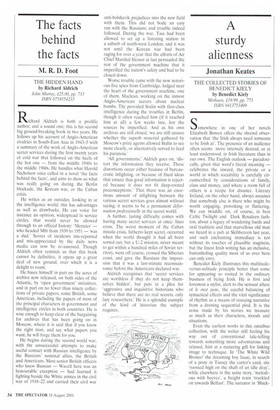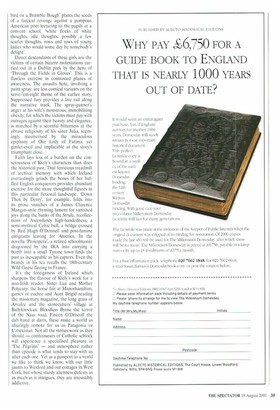A sturdy alienness
Jonathan Keates
THE COLLECTED STORIES OF BENEDICT KIELY by Benedict Kiely Methuen, £19.99, pp. 773
ISBN 0413753409
Somewhere in one of her novels Elizabeth Bowen offers the shrewd observation that 'the Irish always need someone to be Irish at'. The presence of an audience often seems more intensely desired, or at least understood, in Irish literature than in our own. The English outlook — paradoxically, given that word's literal meaning — celebrates the inward, the private or a world in which sociability is carefully circumscribed by considerations of family, class and money, and where a room full of others is a recipe for disaster. Literary Ireland, on the other hand, always assumes that somebody else is there who might be worth engaging, provoking or flattering. We can twaddle on, of course, in best Celtic Twilight and Dark Rosaleen fashion, about a legacy of wandering bards and oral tradition and that marvellous old man we heard in a pub at Skibbereen last year, and such enchanting immediacy is not without its touches of plausible staginess, but the finest Irish writing has an inclusive, buttonholing quality most of us over here can only envy.
Benedict Kiely illustrates this multitudeversus-solitude principle better than some for appearing so rooted in the ordinary business of being Irish. He is first and foremost a stylist, alert to the sensual allure of le mot juste, the careful balancing of syntactical effects and the vital significance of rhythm as a means of rescuing narrative from a droning sequential plod. It is the noise made by his stories we treasure as much as their characters, moods and situations.
Even the earliest works in this omnibus collection, with the writer still feeling his way out of conventional tale-telling towards something more adventurous and relaxed, hint at a maturing gift for linking image to technique. In The White Wild Bronco' the dreaming boy Isaac, in search of a pony in Tansey the carter's yard, sits 'roosted high on the shaft of an idle dray', while elsewhere in the same story, 'melodious with beeves', a freight train 'truckled on towards Belfast'. The narrator in 'Black bird on a Bramble Bough' plants the seeds of a farcical revenge against a pompous American poet lecturing to the pupils at a convent school, 'white flocks of white thoughts, idle thoughts, possibly a few scarlet thoughts, rows and rows of young ladies who would some day be somebody's delight'.
Direct descendants of these girls are the victims of certain bizarre molestations carried out in a Dublin park by the hero of 'Through the Fields in Gloves'. This is a flawless exercise in contrasted planes of awareness. The assaults here, involving a paint spray, are less comical variants on the serve-'em-right theme of the earlier story. Suppressed fury provides a live rail along the narrative track. The spray-gunner's anger at his wife's monstrous, immobilising obesity, for which the victims must pay with outrages against their beauty and elegance, is matched by a scornful bitterness at the obtuse religiosity of his sister Julia, seemingly mesmerised by the miraculous epiphany of Our Lady of Fatima, yet gimlet-eyed and implacable at the story's triumphant close.
Faith lays less of a burden on the consciousness of Kiely's characters than does the historical past. That ferocious treadmill of archival memory with which Ireland everlastingly grinds the bones of her baffled English conquerors provides abundant exercise for the more thoughtful figures in this particular fictional landscape. 'Down Then by Derry', for example, folds into its prose snatches of a James Clarence Mangan-style rhyming lament for vanished joys along the banks of the Strule, recollections of Ascendancy high-handedness, a semi-mythical Celtic bull, a bridge crossed by Red Hugh O'Donnell and post-famine emigrants leaving for America. In the novella `Proxopera', a retired schoolmaster dragooned by the IRA into carrying a bomb into a small Tyrone town finds the past as inescapable as his captors. Even the brandy in his tea recalls the 18th-century Wild Geese fleeing to France.
It's the foreignness of Ireland which sharpens the flavour of Kiely's work for a non-Irish reader. Sister Lua and Mother Polycarp, the horse fair at Manorhamilton, games of euchre and Aunt Brigid reading the missionary magazine, the long grass of Arvalee and the stonecutters' village at Ballyknockan, Bloodless Byrne the terror of the Naas road, Fineen O'Driscoll the dab hand at darts, these make a world as alluringly remote for us as Patagonia or Uzbekistan. Not all the stories work as they should — connoisseurs of Catholic schlock will experience a specialised pleasure in 'The Pilgrims' — and atmosphere rather than episode is what tends to stay with us after each one, Yet as a passport to a world we like to think we know, with our little jaunts to Wexford and our cottages in West Cork, but whose sturdy alienness defeats us as much as it intrigues, they are irresistibly addictive.



























































 Previous page
Previous page